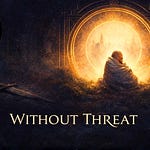Gratitude in a Mixed World
There is a strange quiet that settles over the landscape this time of year. Not silence exactly, but the thickened hush that comes when winter begins to gather itself at the edge of the horizon. The bright colors fade into deeper tones. The days shrink. The nights stretch. And somewhere inside that long dark, something ancient begins to stir.
Gratitude always feels different in this season. It does not arrive as a cheerfulness or a forced smile. It comes more like breath in cold air, visible for a moment before it disappears, reminding you that you are alive, still moving, still here. This year especially, I feel the weight of a world that is hurting, and the resilience of a heart that refuses to close. Gratitude has become less about counting blessings and more about choosing to see that there is another way to live.
Because let’s be honest. Many people have chosen to live life on “difficult mode.” They cling to a belief that the only way forward is to make someone else fall behind. They accept stories that tell them scarcity is inevitable, cruelty is necessary, and the suffering of a neighbor is simply the cost of their own survival. Governments amplify these lies. Systems reward them. And people absorb them until they feel like it is the only possible shape of the world.
But gratitude, real gratitude, is a radical act. It refuses that worldview. It says: there is more than this. It whispers: you can choose differently.
And that is what has been sitting on my heart this year. Even in the midst of hardship, even with so many living in fear, even with power systems grinding down the most vulnerable, we still have the ability to imagine better. Gratitude does not erase pain. It does not ask us to pretend. It invites us to see the small openings that remain, the slivers of light that widen into possibility.
Every November, the same story tries to reassert itself in our collective memory. A story of pilgrims and Indigenous people sharing a peaceful feast, a myth invented long after the fact to soothe a national conscience uneasy with the truth. The real history is far more complex and far more tragic, shaped by violence, theft, and cultural erasure. And yet the myth persists because something in us longs for the image of people sitting down at one table, recognizing each other’s humanity.
I don’t honor the myth, but I do honor the longing.
That longing is a tender thing. It points toward the world we wish we had inherited and the world we are still capable of building. It asks us to tell the truth about the harm done and still find a way to nourish the good that remains.
This is where gratitude becomes holy. Not as denial, but as practice. Not as distraction from suffering, but as one of the ways we refuse to let suffering be the final word.
We begin with awe, the first of the Four Paths. Awe at the simple fact that we can feed one another, that despite the greed of corporations and the cruelty of policies, we still live in a world where abundance is possible. Awe that we can see what is happening in the world rather than living in the dark, because our phones let us witness what once would have stayed hidden in silence. Awe that even in grief, we are capable of compassion.
From awe, we move into the Via Negativa, the honest naming of what is broken. Gratitude does not deny harm. It looks directly at it and refuses to let it consume the entire horizon. Gratitude says: yes, this is true, and yes, there is still something good. It is the art of holding both at once, of letting sorrow deepen us without hollowing us out.
Then gratitude leads us into the Via Creativa, because once you recognize small goodness, something in you wants to protect it. You begin to imagine ways to nurture it, expand it, share it. Gratitude makes us inventive. It makes us curious about what might grow if we cared for it. It turns us toward actions that feel humble and hopeful at once.
And finally, gratitude draws us into the Via Transformativa. The small good we recognize, the small good we celebrate, becomes fuel for justice. Gratitude gives us the energy to tend the world, to push back against cruelty, to choose a path that leads toward healing. Gratitude is not passive. It is preparation. It is the way we gather strength for the work ahead.
Brian and I harvested our sunchokes this year, waiting as instructed until the first hard frost had passed. We planted them without knowing what to expect, without knowing how they’d take to the soil, without knowing if they’d flourish or fail. When we finally pulled them from the earth, they were generous.
And as we washed them and sorted them, we found ourselves instinctively doing what people have done for millennia. We measured the harvest. We appreciated the effort that led to it. We saved the seeds, thought about next year, and planned how to care for the soil that cared for us.
That cycle is older than any nation, older than any holiday, older than any myth. Gather the seeds. Plant them. Tend them. Harvest. Share. Repeat. Gratitude is the thread that runs through the whole pattern. It keeps us from taking what we have for granted. It reminds us that we are part of a living world. It keeps us humble enough to learn from our mistakes and hopeful enough to try again.
Even abundance teaches. We noticed where we planted too closely, where the light didn’t quite reach, where the soil could use more care. We didn’t fixate on what didn’t go perfectly. Gratitude pointed us toward what went well and gave us the courage to improve what needs tending. This is the wisdom of the season: not everything will flourish, but what grows will teach you how to grow more.
Thanksgiving, as practice, is not about reenacting a myth or pretending everything is fine. It is about choosing to create a sacred space where honesty and gratitude can coexist. Sometimes that means setting boundaries with kin who drain rather than nourish. Sometimes that means choosing your chosen family, the ones who hold you up, the ones who care in ways blood relatives may never understand.
Sacred space is not neutral. It has structure. It has intention. It has rules meant to protect what is tender and alive. In our home, we keep Thanksgiving as a feast day. And part of the feast is naming what we are grateful for. Not to ignore pain. Not to suppress anyone’s truth. But to build the kind of atmosphere where celebration can open us to hope.
Protecting sacred space is an act of love. It is how we make sure the meal nurtures us instead of draining us. It is how we remember that we belong to each other in ways deeper than blood.
So here we are, standing on the threshold of winter. The world feels heavy. Many people are hurting. Systems are grinding along with impersonal force. And yet gratitude calls us still.
Gratitude says: measure what is good. Not because the good is winning. Not because the good is loud. But because the good is real, and naming it helps us keep going.
Gratitude says: tend what is growing. Celebrate what is alive. Protect what is tender. Let joy be an act of resistance.
Gratitude says: imagine a better world. Dream of abundance, not as fantasy but as a path already unfolding beneath your feet.
And gratitude says: you can choose differently. You can plant new seeds. You can harvest new possibilities. You can live in a way that does not demand someone else’s suffering for your survival.
This year, Thanksgiving feels less like a holiday and more like a vow. A vow to tell the truth about harm. A vow to nurture the small goods that sustain us. A vow to keep imagining a world where we feast together in justice and joy.
Winter is long. But gratitude fills the lantern we carry into the dark.
And that light is enough to guide the way.
Thank you for Tips / Donations:
Substack: https://www.creationspaths.com/
New to The Seraphic Grove learn more
For Educational Resource: https://wisdomscry.com
Social Connections:
#Thanksgiving #GratitudePractice
Chapters:
00:00 Introduction & Opening Thoughts
01:41 The Myth of the First Thanksgiving
02:18 Modern Thanksgiving Origins
04:10 The Importance of Acknowledgment & Gratitude
05:45 Finding Gratitude in a Mixed World
06:53 The Power of Documentation & Visibility
08:16 The Art of Balanced Gratitude
09:05 Gratitude Practice: Finding Sensation in Pain
09:56 Jewish Practice of Blessings
11:08 Compassion: Balancing Positive & Negative
12:12 Thanksgiving as Active Practice
13:32 Winter Planning & Preparation
14:55 Sunchoke Harvest: A Personal Example
16:24 Celebrating the Harvest
17:12 Redefining Family for Thanksgiving
17:56 Setting Boundaries: Gratitude as Sacred Space
19:04 Chosen Family & True Connection
19:55 Hex-Giving: Making Space for Goodness
20:28 Upcoming Study: Creation’s Path Book
22:23 Closing Prayer & Farewell









